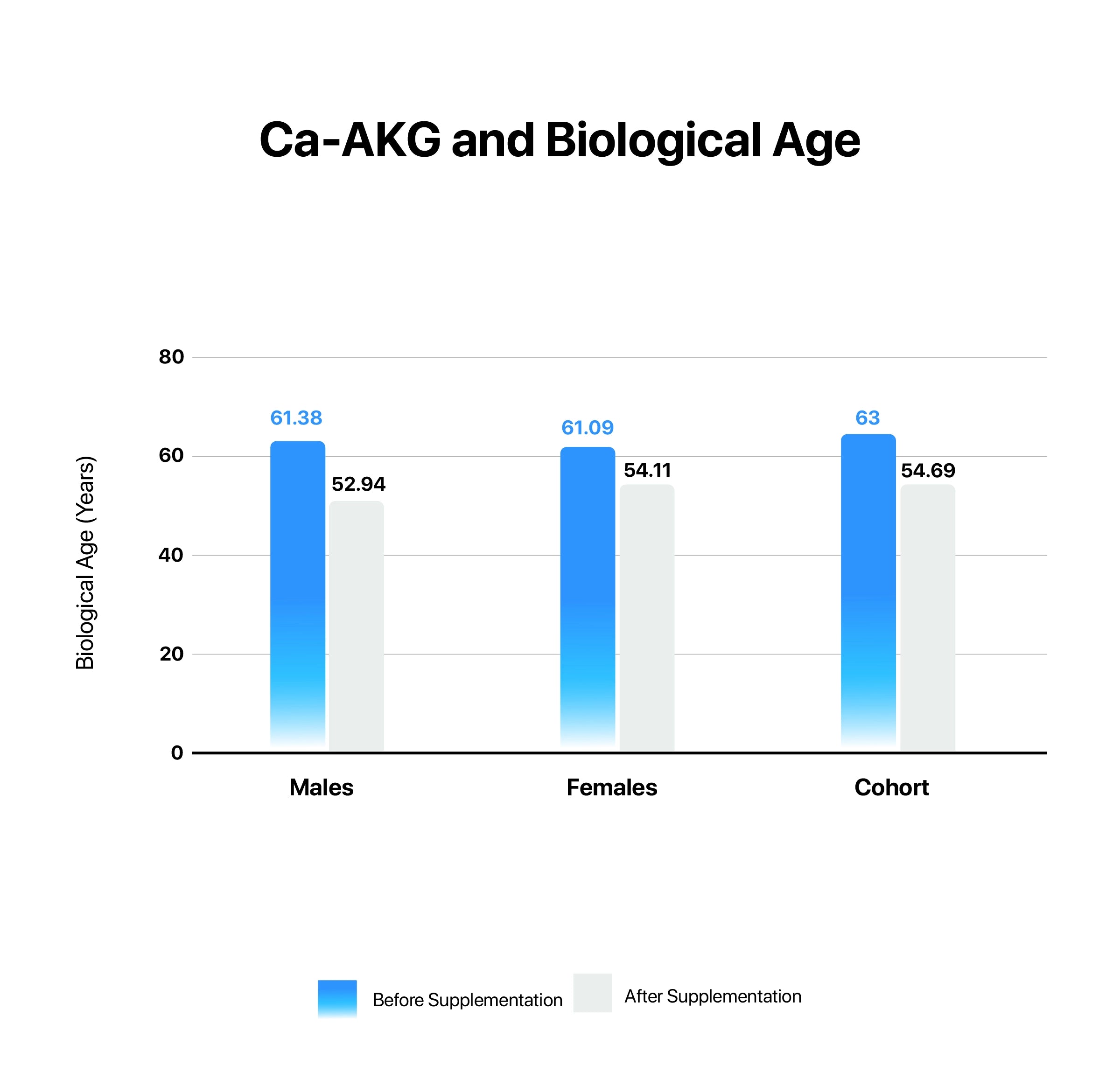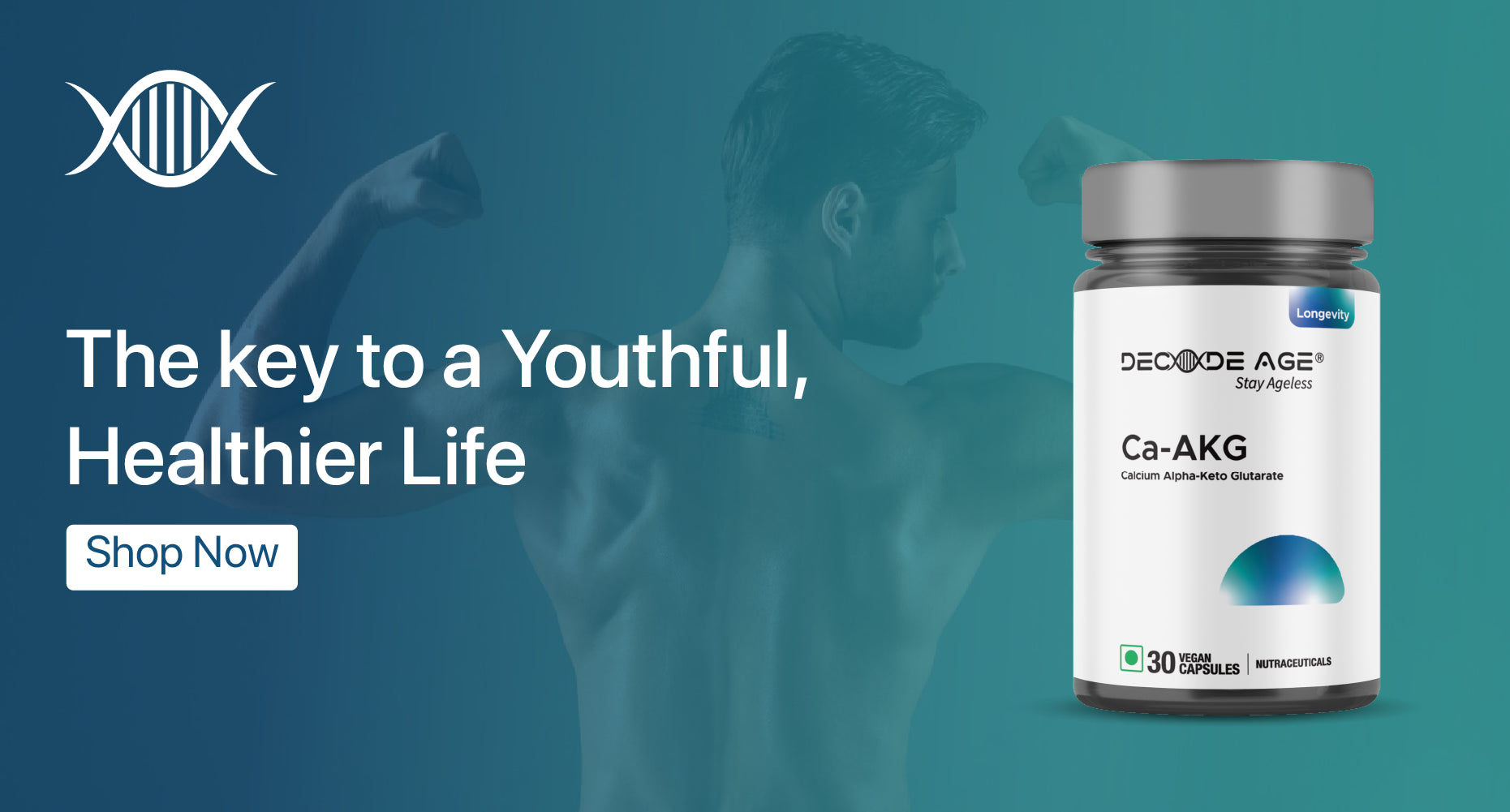Ageing is a biological process often characterised by declining health and increased vulnerability to diseases like Alzheimer's, cardiovascular diseases, and diabetes. It is mainly of two types: chronological age and biological age. Biological Age is affected by many factors such as genetics, lifestyle, and health conditions. Alpha-ketoglutarate (AKG), a metabolite in the Krebs cycle shows promising results in reducing biological age and extending human lifespan. As individuals age, AKG levels decline, impacting metabolic and cellular functions. AKG serves as a signalling molecule, energy donor, and precursor in amino acid synthesis.
In this blog, we will discuss the clinical trial of the Rejuvant® supplement consisting of Ca-AKG and Vitamin D or Vitamin A based on gender differences.
Study and Design
The study was conducted by Demidenko and his colleagues. It involved a group of 42 individuals (14 females and 28 males) who provided saliva samples for epigenetic testing. TruAge kit, named TruMe, was used for determining epigenetic biological age. Each individual began taking two Rejuvant tablets per day, with each tablet containing 1gm of Ca-AKG and respective vitamins, based on gender– vitamin A for males and vitamin D for females. Participants took the tablets for a duration of 4 to 10 months, averaging at 7 months. They filled out a questionnaire about their lifestyle habits, which covered aspects such as diet, exercise, sleep, alcohol intake, smoking, and use of nutritional supplements. This questionnaire was used to monitor individuals' habits before and after the study. At the end of the trial, participants also filled out a survey.
Effect of Ca-AKG + Vitamin Supplementation on Biological Ageing
To determine the biological age of an individual, the TruAge DNA methylation test was used. Among a subset of 13 individuals who maintained consistent lifestyle factors, Ca-AKG supplementation yielded a notable reduction in biological age. Before the study, they were on average 2.06 years biologically younger than their chronological age, and by the end of the treatment period, this group had achieved an average biological age of 9.74 years younger. This difference, amounting to 7.69 years, was statistically significant.
Similarly, when considering the entire cohort of 42 patients, there was a remarkable decrease in biological age. After the study, they were on average 0.35 years younger than their chronological age, which shifted to an average of 8.31 years younger by the treatment's end. The difference in means, 7.96 years, was also statistically significant.

Figure 1: Changes in Biological Age Before and After Ca-AKG Supplementation
This figure shows the impact of Ca-AKG supplementation on biological age in males and females. Before supplementation, the biological age of both males and females was 61.38 years and 61.09 years. After supplementation, males averaged 52.94 years and females 54.11 years. The overall cohort's average age dropped from 63 to 54.9 years. Males experienced a mean decrease of 8.44 years, while females saw a decrease of 6.98 years.
Gender Differences
The supplement formulation under test varied between males and females, incorporating additional vitamins tailored to each gender. Despite this difference, the supplementation consistently led to a reduction in epigenetic age for both males and females, exhibiting statistical significance. In males, the paired mean decrease was 8.44 years, while in females, it was slightly lower at 6.98 years. This demonstrates the effectiveness of Ca-AKG + vitamins in mitigating age-related changes at the epigenetic level across genders.
Overall, the study demonstrates that a blend of Ca-AKG and vitamins, exhibited an average reduction of 8 years in biological ageing, as determined by the TruAge DNA methylation test, following an average usage period of 7 months.
Conclusion
The study findings reveal the remarkable potential of Ca-AKG supplementation in reducing biological age and promoting longevity. In a subset analysis of 13 participants, each subject experienced a significant decrease in biological age, with an average reduction of 7.69 years. Moreover, when considering the entire cohort of 42 patients, the average reduction in biological age was 7.96 years.
References
Rejuvant®, a potential life-extending compound formulation with alpha-ketoglutarate and vitamins, conferred an average 8-year reduction in biological aging, after an average of 7 months of use, in the TruAge DNA methylation test.
(Demidenko, O., Barardo, D., Budovskii, V., Finnemore, R., Palmer III, F. R., Kennedy, B. K., & Budovskaya, Y. V. (2021). Rejuvant®, a potential life-extending compound formulation with alpha-ketoglutarate and vitamins, conferred an average 8-year reduction in biological aging, after an average of 7 months of use, in the TruAge DNA methylation test. Ageing (Albany NY), 2021.)
FAQs
1) What is Biological Age?
Biological age reflects an individual's physiological state based on various health markers – factors like cellular health, biomarkers, and lifestyle influences. Unlike chronological age, it offers insights into overall well-being, disease risk, and longevity. Assessing biological age aids in understanding ageing processes and informing personalised health interventions to promote healthy ageing and extend lifespan.
2) Does alpha-ketoglutarate extend lifespan?
Alpha-ketoglutarate (AKG) shows promising effects in extending lifespan in various organisms like fruit flies, mice, and roundworms. It influences survival pathways, regulates nitrogen balance, and exhibits antioxidant properties. Clinical trials suggest that AKG enhances muscle growth, wound healing, energy levels, and immunity. While further research is needed to confirm its effects in humans, AKG presents significant implications for improving health span and potentially extending lifespan through its multifaceted physiological benefits.
3) What is the difference between calcium AKG and AKG?
Calcium AKG (Ca-AKG) is a salt formed when alpha-ketoglutarate (AKG) binds with calcium. While both compounds share AKG's properties, Ca-AKG offers enhanced efficacy and bioavailability. Ca-AKG is recognized for its potential to promote muscle health, wound healing, and longevity. Additionally, it supports heart and cellular health. Its unique formulation provides benefits beyond those of AKG alone, making it a promising compound for various health applications.
4) What is the function of Ca-AKG?
Ca-AKG, or calcium alpha-ketoglutarate, plays a vital role in cellular energy metabolism and signalling pathways. It serves as a precursor for glutamine synthesis, promoting protein synthesis, reducing muscle protein degradation, and fueling cellular metabolism. Additionally, Ca-AKG's binding with calcium enhances its efficacy and bioavailability, supporting heart health, and cellular function, and potentially aiding in the reversal of signs of biological ageing.
5) What supplements reduce biological age?
Supplements like Decode Age Calcium alpha-ketoglutarate (Ca-AKG) reduce biological age. This compound supports cellular energy processes and influences pathways associated with healthy ageing, such as DNA methylation and inflammation. Clinical trials demonstrate their potential to enhance muscle health, wound healing, and immune function. Ca-AKG supplementation offers a promising avenue for slowing down the ageing process and promoting overall well-being.
6) Which is the best Ca-AKG supplement in India?
The best Ca-AKG supplement in India is Decode Age calcium-alpha-ketoglutarate. Firstly, they enhance cellular energy production, crucial for overall bodily functions. Additionally, Ca-AKG promotes muscle health, aiding in repair and growth. Moreover, it accelerates wound healing processes and reverses biological ageing, potentially extending lifespan.


















Leave a comment
All comments are moderated before being published.
This site is protected by hCaptcha and the hCaptcha Privacy Policy and Terms of Service apply.